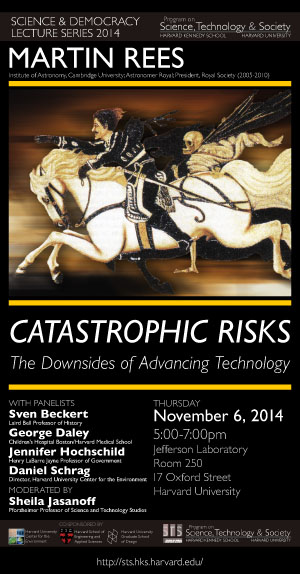Program on Science, Technology and Society at HarvardHarvard Kennedy School of Government | Harvard University |
|||||||
|
|
Catastrophic Risks: The Downsides of Advancing TechnologyMartin ReesNovember 6, 2014, 5:00pm-7:00pm AbstractOur Earth is 45 million centuries old. But this century is the first when one species ours can determine the biosphere's fate. Threats from the collective "footprint" of 9 billion people seeking food, resources and energy are widely discussed. But less well studied is the potential vulnerability of our globally-linked society to the unintended consequences of powerful technologies not only nuclear, but (even more) biotech, advanced AI, geo-engineering and so forth. These are advancing fast, and bring with them great hopes, but also great fears. They will present new threats more diverse and more intractable than nuclear weapons have done. More expertise is needed to assess which long-term threats are credible, versus which will stay science fiction, and to explore how to enhance resilience against the more credible ones. We need to formulate guidelines that achieve optimal balance between precautionary policies, and the benign exploitation of new technologies. We shouldn't be complacent that the probabilities of catastrophe are miniscule. Humans have survived for millennia, despite storms, earthquakes, and pestilence. But we have zero grounds for confidence that we can survive the worst that the future can bring. It's an important maxim that "the unfamiliar is not the same as the improbable. Video of this lecture is located here. PanelSven BeckertLaird Bell Professor of History George DaleyChildren’s Hospital Boston/Harvard Medical School Jennifer HochschildHenry LaBarre Jayne Professor of Government Daniel SchragDirector, Harvard University Center for the Environment Moderated bySheila JasanoffPforzheimer Professor of Science and Technology Studies About the speakerMartin Rees is a Fellow of Trinity College and Emeritus Professor of Cosmology and Astrophysics at the University of Cambridge. He holds the honorary title of Astronomer Royal and is also Visiting Professor at Imperial College London and at Leicester University. In 1973, he became a fellow of King’s College and Plumian Professor of Astronomy and Experimental Philosophy at Cambridge and served for ten years as director of Cambridge’s Institute of Astronomy. From 1992 to 2003 he was a Royal Society Research Professor, and then from 2004 to 2012, Master of Trinity College. In 2005 he was appointed to the House of Lords and was President of the Royal Society for the period 2005-2010. He is the author or co-author of more than 500 research papers, mainly on astrophysics and cosmology, as well as eight books (six for general readership), and numerous magazine and newspaper articles on scientific and general subjects. His main research areas are in high energy astrophysics, cosmic structure formation, and general cosmological questions. Among his many honors are the Faraday Prize (2004), the Order of Merit (2007), and the Templeton Prize (2011). Co-sponsored by the Harvard University Center for the Environment, the Harvard School of Engineering and Applied Sciences, and the Harvard University Graduate School of Design. About the poster image: The painting of the rider, horse, and Death is adapted from a painting by Edmund Youngbauer (1869-1954), Die Jagd Nach Dem Gluck (Chasing After Happiness) (data ca. late 19th century). |
||||||
